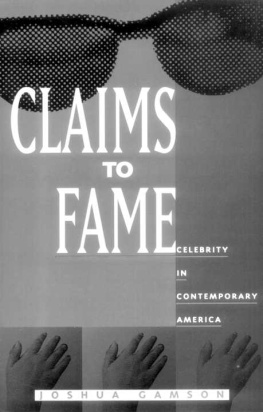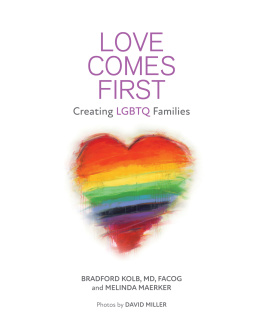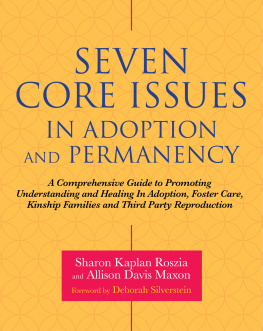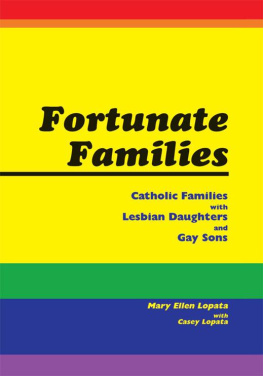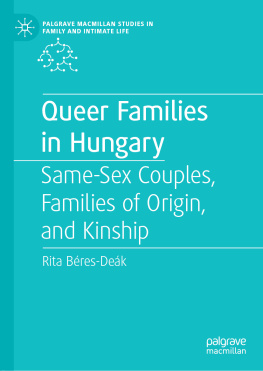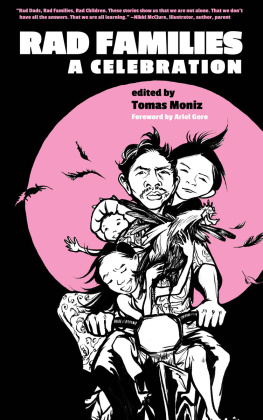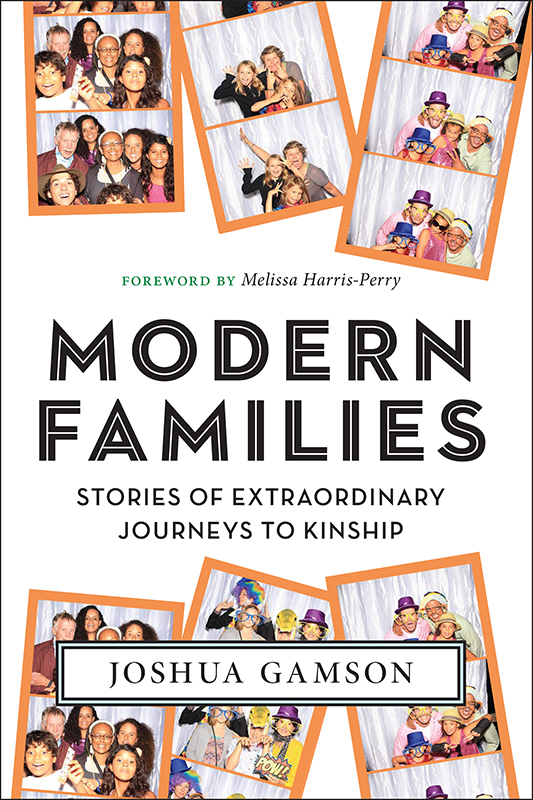
Modern Families
Modern Families
Stories of Extraordinary Journeys to Kinship
Joshua Gamson
Foreword by Melissa Harris-Perry

NEW YORK UNIVERSITY PRESS
New York and London
NEW YORK UNIVERSITY PRESS
New York and London
www.nyupress.org
2015 by New York University
All rights reserved
Frontispiece: William Haefeli / The New Yorker Collection / The Cartoon Bank.
References to Internet websites (URLs) were accurate at the time of writing. Neither the author nor New York University Press is responsible for URLs that may have expired or changed since the manuscript was prepared.
Library of Congress Cataloging-in-Publication Data
Gamson, Joshua, 1962
Modern families : stories of extraordinary journeys to kinship / Joshua Gamson ; foreword by Melissa Harris-Perry.
pages cm Includes bibliographical references and index.
ISBN 978-1-4798-4246-9 (cl : alk. paper)
1. FamiliesHistory21st century. 2. Racially mixed families. 3. Gay parents. 4. Human reproductive technology. 5. Kinship. I. Title.
HQ519.G36 2015
306.8509730905dc23 2015009609
New York University Press books are printed on acid-free paper, and their binding materials are chosen for strength and durability. We strive to use environmentally responsible suppliers and materials to the greatest extent possible in publishing our books.
Manufactured in the United States of America
10 9 8 7 6 5 4 3 2 1
Also available as an ebook
For Reba Sadie and Madeleine Blanche
Contents
Melissa Harris-Perry
That the personal is political has been a central tenet of feminist theory and practice for fifty years. It is the guiding philosophy on which I was raised. My own mother was a divorced white woman with a young daughter when she chose to love, but not marry, my African American father; to have a child with him; and to rear me in the American South less than a decade after the statutory end of Jim Crow. Throughout my childhood, the politics of personal choices sat at our kitchen table, awaited us on the doorstep, and stalked us through public spaces.
Mom was a staunch supporter of reproductive rights and served as part of an underground railroad that allowed women to access abortion services before Roe v. Wade. Along with her graduate school colleagues, she penned a slim volume about treating and avoiding sexually transmitted diseases titled How to Have Intercourse without Getting Screwed. She worked as a juvenile parole counselor and wrote a masters thesis on prostitution. Still, she firmly rejected multiple suggestions that she terminate her pregnancy to avoid having a biracial child who would be confused and rejected. I still remember my mother belting out the lyrics to Diana Ross and the Supremes Love Child while she bustled around the house on Saturday mornings.
All of which made it surprising that I was such a conventional kid. Despite my public reputationamong someas a fierce advocate for racial, gender, and LGBT equality, my private life progressed like a 1980s after-school special. I finished graduate school, had a big white wedding where I married my college sweetheart, moved to the big city, bought a place, swiftly and easily got pregnant, accomplished unmedicated childbirth, nursed my baby girl for nearly a year, and then started thinking about a second child. I had been raised on a lean diet of political investment in personal choices but was enjoying the feast of the normativeuntil it unraveled.
By the time my daughter started first grade, my marriage was over, the ugly custody dispute raged on, and after years of wrestling with the agony of fibroids, I had finally relinquished my uterus to hysterectomy. Being a black single mother facing the inequities of the family court system while learning to experience myself as a whole woman despite my inability to reproduce allowed me to wrestle in deeply personal ways with my feminist political commitments. But those experiences were nothing in comparison to the ideological complications I encountered when I entered the world of third-party, assisted, reproductive technology.
Third-party, assisted, reproductive technology must be the most obfuscating euphemism in contemporary discourse. What really happened is I met and married an astonishing human. This man had no children but became a doting and beloved parent to my daughter. And this manwhose very affection for my girl belied the irrelevance of genetic ties in family makingnonetheless wanted to have a child that was biologically tied to both of us. And while I had given up my broken uterus, I had kept my aging but active ovaries. So his dream of a little us was technically possible but ethically troubling, because this new life would require the involvement of a working uterus. And that uterus would reside within an actual person. And that person would be a woman. And that woman would receive financial compensation for carrying and giving birth to our baby. And I had absolutely no idea how to reconcile this personal choice with my own political commitments.
Research did little to help. Most texts fell into two dissatisfying genres: one of intellectual but bloodless academic texts that warn against the commercialization of reproduction without a full accounting for the genuine humanity in this process; and the second of triumphant personal narratives that pretend personal desire and positive outcomes are sufficient to transform troubling transactional aspects of unconventional family making into uncontroversial stories of love and destiny.
I needed to know if it was possible to reproduce ourselves without reproducing racism and misogyny. Could we expand our family without deepening imperialism and class inequality? I was searching for hope but not a free pass. This was a deeply personal choice with far-reaching political implications. I needed a clear-eyed guide through both. In short, I needed the book you are now holding.
In the stories that follow, you will encounter authentic, imperfect, thoughtful individuals making unconventional families by accessing a broad range of technological, medical, and legal choices that expand our definitions of parenting and kinship. As you read these stories, you will discover many satisfying new beginnings but no happy endings, because child rearing is process, not destination. These family-making journeys raise hard questions but offer no formulaic answers. These are stories of choices made consciously and sometimes uncomfortably to create and combine lives amid the messy human realities of desire, commerce, science, faith, community, and family. This collection is not a roadmap; it is a companion for all those who choose to navigate the world of modern kinship.
And for my second daughter, who was made of the genetic material of her parents and born of a beloved gestational surrogate on Valentines Day, this book may someday help her understand all the questions that accompanied her extraordinary journey into our lives.
Melissa Harris-Perry
Presidential Endowed Chair in Politics and International Affairs
Executive Director, Pro Humanitate Institute
Director, Anna Julia Cooper Center
Wake Forest University
Host, MSNBCs Melissa Harris-Perry
If it takes a village to raise a child, it takes a midsized town to nurture a book. Im very grateful to the townspeople who helped me. For comments, support, and companionship, thanks to Amy Aronson, Sarah Cowan, William Gamson, Zelda Gamson, Ellen Levine, Stephen Levine, Sarah Anne Minkin, Rachel Neumann, Hagar Scher, France Winddance Twine, and Rhea Wilson. At the beginning of this project, I was supported by a fellowship from the John Simon Guggenheim Memorial Foundation, and the research was supported along the way by the University of San Franciscos Faculty Development Fund. The anonymous reviewers for NYU Press offered me a much-needed, friendly intellectual push. Im deeply obliged to Ilene Kalish, my editor at NYU Press, whose unflagging belief in the project, along with critical commentary, motivated and invigorated me at crucial times. Richard Knight, my partner in life and in family making, encouraged me to keep writing in the midst of the rigors of child rearing and day jobs; he was a gracious, generous participant in the storytelling process, a fair critic, and an indulgent sounding board, and he remains, fifteen years in, an excellent playmate and ally. Most of all, I am grateful to the families, who are also my friends, who shared with me their time and stories: to be trusted with such cherished, delicate, and intimate tales was an honor that I can only hope this book returns.
Next page

